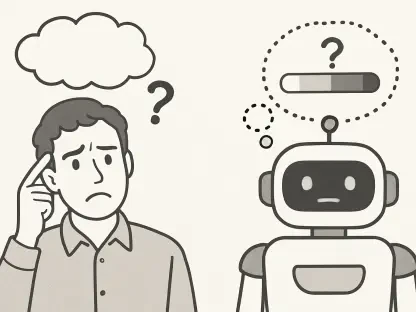In a dynamic partnership reshaping the manufacturing landscape, GFT and Google Cloud are integrating advanced AI technologies to meet the industry’s evolving demands. The collaboration focuses on leveraging AI to enhance manufacturing efficiency and productivity, responding to a growing need for technological advancements. As digital transformation becomes essential for companies, the partnership aims to address pressing challenges, including operational efficiency and cost management. GFT, a global leader in digital transformation, joins forces with Google Cloud to deliver innovative solutions using AI. This alliance represents a strategic response to manufacturers actively seeking cutting-edge technology applications for improving productivity. Together, GFT and Google Cloud have set the stage for a digital revolution, underscored by their implementation of the Manufacturing Data Engine last year, which laid the foundation for several innovative AI use cases now expanded through Google’s upgraded Gemini Models.
Advancing AI in Manufacturing
Integrating AI into manufacturing processes is not merely a technological trend but a necessary advancement to address various industry challenges. A significant motivation for manufacturers today includes improving operational efficiencies and reducing costs. With AI becoming central to these objectives, companies are exploring opportunities for seamless integration into their operations. Google Cloud’s Manufacturing Data Engine plays a crucial role in developing AI applications tailored to this sector. It serves as a robust framework that enables multiple AI use cases, targeting specific pain points in manufacturing. The focus is on employing AI to deliver tangible improvements in production processes, from enhancing machine reliability to forecasting production needs.
Many manufacturers worldwide are actively pursuing AI-driven solutions to transform traditional methodologies into data-driven models. The integration aims to optimize workflows, increase productivity, and improve quality while cutting expenses. Essential AI applications include visual inspection for quality assurance, predictive maintenance to prevent machinery breakdowns, and automated production forecasting. By implementing these innovations, manufacturers aim for more precise operations, reducing inefficiencies and driving sustainable practices that benefit the entire industry. Google Cloud’s contribution through the Manufacturing Data Engine establishes a pivotal infrastructure, supporting advanced AI capabilities that significantly boost manufacturing efficiency.
Innovative AI Applications
Groundbreaking AI applications from the partnership between GFT and Google Cloud are poised to redefine manufacturing practices. One notable tool developed through this collaboration identifies the root causes of errors and defects in manufacturing processes. By pinpointing the source of issues promptly, this AI-powered solution facilitates quick interventions, thereby minimizing the production of faulty items. It builds upon a previous visual inspection tool designed to automatically remove defective parts from assembly lines, yet expands its capabilities to not only rectify defects but also prevent future occurrences, thus optimizing production quality.
The precision of this AI application marks a new era in error management, as it enables manufacturers to implement corrective measures swiftly. No longer restricted to identifying visual faults, the tool delves deeper by analyzing data to discern patterns that lead to defects. By understanding underlying causes, organizations can enact preventive measures, significantly reducing waste and increasing production standards. This advancement in AI application reflects the potential of technology to transform conventional manufacturing processes, presenting a solution that redefines quality management and production optimization.
Generative AI for Training
Generative AI is revolutionizing traditional training manuals by converting them into interactive, avatar-led virtual demonstrations. This innovative approach addresses training challenges by creating immersive and efficient tutorials that facilitate learning. Underpinning this transformation are Google Gemini Models, which offer dynamic and engaging learning experiences, reducing the need for time-consuming hands-on training sessions. This application proves invaluable in bridging the skill gap left by a shortage of seasoned practitioners, allowing their expertise to be digitally accessed and assimilated across factory floors.
Through generative AI, complex machine operations become more manageable as personnel can learn through interactive simulations. The conversion not only enhances understanding but also accelerates the learning curve, allowing workers to grasp intricate tasks with greater proficiency. As expertise is captured digitally, it safeguards valuable knowledge and ensures that skills are preserved and passed down seamlessly. This mode of training embodies the potential of AI in fostering a continuous learning environment, enriching workforce capabilities while addressing current skill shortages quintessential to manufacturing growth.
AI-Enhanced Decision Making
AI-powered visual dashboards introduce a new era in decision-making within manufacturing, enabling personnel to interact with organization-wide data intelligently and intuitively. These dashboards offer natural language processing capabilities, allowing stakeholders to query data with ease and derive actionable insights. By democratizing data access, they empower factory staff at all levels, from shift managers to senior executives, to make informed decisions based on real-time information, thus enhancing communication and overall organizational alignment.
The role of these visual dashboards extends beyond data access, streamlining decision-making processes and fostering a culture of informed choices. Factory personnel can translate complex data sets into understandable formats, ensuring everyone remains updated on operational status and can act decisively when needed. By providing tailored data responses through natural language queries, dashboards reduce the barriers to data comprehension and promote better interdepartmental communication. This innovation shines a spotlight on the importance of AI in optimizing organizational workflows, encouraging transparent communication, and driving strategic decisions that align with long-term business goals.
Proactive Maintenance Solutions
As manufacturing processes become increasingly complex, predictive maintenance emerges as a vital strategy supported by new AI models. Enhancements in AI capabilities allow for proactive scheduling of maintenance tasks by predicting parts obsolescence and assuring timely inspections. This foresight minimizes unexpected equipment failures, ensuring operations run smoothly without significant disruptions. The development of these models marks a progressive step toward enhancing machine reliability and optimizing operational efficiency while reducing downtime.
The impact of predictive maintenance extends far into operational management, addressing issues before they escalate into major concerns. Rooted in robust AI analysis, the system anticipates needs for parts replacement before their wear affects production, ensuring effective maintenance scheduling. This approach highlights the essential role of AI in increasing machine uptime, prolonging equipment lifespan, and ensuring consistent manufacturing output. Such advancements underscore the importance of preemptive strategies in transforming maintenance paradigms, fostering reliability across complex networks while balancing productivity demands.
Expertise-Driven AI Adaptation
Incorporating AI into manufacturing isn’t just a tech trend but a vital advancement addressing industry challenges. Manufacturers aim to boost operational efficiency and cut costs, and AI is becoming essential in achieving these goals. Companies are actively seeking ways to seamlessly integrate AI into their processes. Google Cloud’s Manufacturing Data Engine plays a key role in crafting AI applications specific to this field. It’s a robust framework supporting varied AI use cases that target manufacturing challenges. The objective is leveraging AI to enhance production, from improving machine reliability to predicting production needs accurately.
Globally, manufacturers are adopting AI to revamp traditional methods into data-driven models, optimizing workflows, boosting productivity, improving quality, and reducing costs. Key AI applications involve visual inspection for quality checks, predictive maintenance to avoid machine failures, and automated production forecasting. These innovations aim for precise operations and sustainability. Google Cloud’s Manufacturing Data Engine provides the infrastructure for advanced AI, significantly enhancing manufacturing efficiency.








